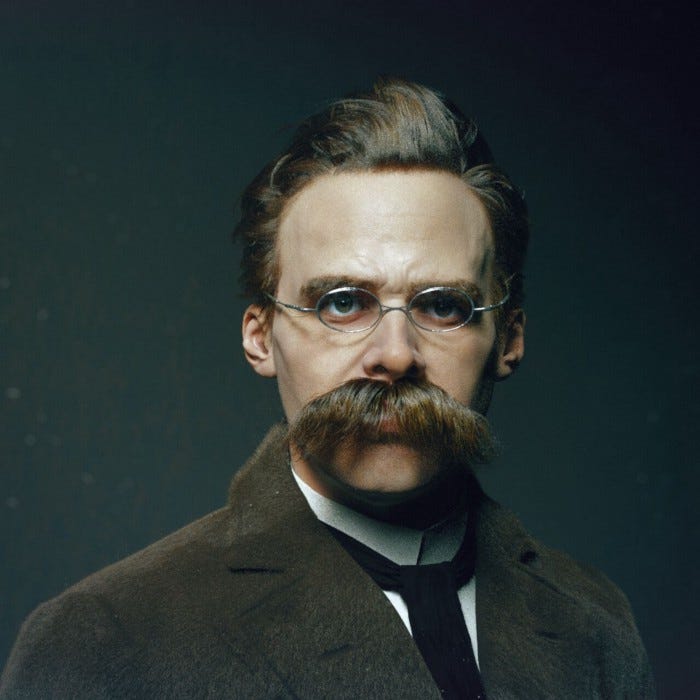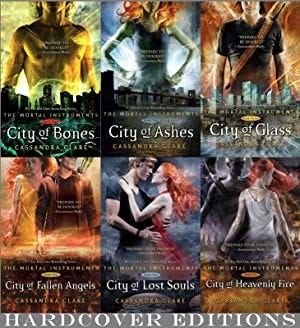024: What Nietzsche Worried About
Or, somehow I managed to connect Britney Spears, Chidi Anagonye, and Friedrich Nietzsche and pretend it all makes sense.
Hi friends!
Happy Valentine’s Day, whether you’re boo’d up or spending the holiday on your own. I spent it hanging out with my cat, doing some writing, and treating myself with increasingly complicated meals that are each delicious mostly for how much time I decided to spend on them.
Quick thank you to everyone who participated in my survey over the last two weeks! I am taking the suggestions everyone made into account and working to make this something you’re more excited to get in your inbox every few weeks. Amy, who is a talented writer and wonderful human, won the $20 gift card, so congrats to her.
It took me a long time to decide what to write about today, but when I did it all came out in a torrent of frustration and exclamation points. I toned it down a touch, and it might be one of my favorite things I’ve ever written. So, enjoy!
Inside Sainte-Chapelle, which used to be the personal church of the royal family of France.
God is dead. God remains dead. And we have killed him. How shall we comfort ourselves, the murderers of all murderers? What was holiest and mightiest of all that the world has yet owned has bled to death under our knives: who will wipe this blood off us? What water is there for us to clean ourselves? What festivals of atonement, what sacred games shall we have to invent? Is not the greatness of this deed too great for us? Must we ourselves not become gods simply to appear worthy of it?
You might recognize this quote from the show I talk about most in the world, The Good Place. Chidi rants it at a drug dealer in the episode after he learns of the afterlife and spins out completely. (His emphasis on “WHAT SACRED GAMES SHALL WE HAVE TO INVENT?!” always rings in my head when I think of this idea.) Friedrich Nietzsche first wrote this in his book The Gay Science, published in 1882, though it became more popular when he published Thus Spake Zarathustra a year later.
I took a class on Nietzsche in graduate school. It was a one-year seminar, and I really think I genuinely understood less than 20% of what I read. Not just because I was talking about moral philosophy in French, a language I’m far from fluent in, but because Nietzsche is… dense. My professors were brilliant, the other people in the seminar were brilliant, it’s just that Nietzsche didn’t want to be easily understood.
(Back when I was trying to open my bookstore, I planned to have a leather-bound collection of all of Nietzsche’s books, free to whoever could explain Nietzsche’s concept of Eternal Recurrence in a way that made sense to me. I’m convinced they would have sat there for decades gathering dust because I’m equally convinced no one in the world, including Friedrich Nietzsche, fully understood what the hell he was talking about.)
But this, the concept that God is dead, rattles around in my head a lot, probably because it is one of his more straightforward ideas. Nietzsche wasn’t writing literally. He meant that due to Enlightenment ideals supplanting the old Christian laws and way of life, God’s presence was dead to us. There was no longer a role for God in European lives, so He was as good as dead.
God had, up to that point, played an enormous role in people’s lives. God—or rather, The Church—decided what people ate, who they married, when they slept, how they made money, where they lived their lives. Christianity had an answer for everything. God was always the answer.
Friedrich Nietzsche, from a 4D rendering by Hadi Karimi.
And I think what Nietzsche was getting at is—what happens to all those questions, all those missing answers now that the Church isn’t the only authority? We get to make some for ourselves, which was the whole point of the Enlightenment. But some were wider issues than our own individual desires. A lot of philosophers since Nietzsche have gone on to argue that without religion, we can have no firm basis for morality. I vividly remember sitting at a patio table at a Starbucks, talking about exactly this with a high school senior when I was a high school sophomore, strangely assured of my atheism as if I had all the answers. Chris was less sure—he wondered if we could have morality without God. He thought we needed to keep religion as a force in people’s lives if only to show them how to be good. I was convinced that there were some morals that transcended religion; do not murder, for instance. I didn’t yet know—I couldn’t yet know—about all the other little nuances of life that become moral and ethical issues without maybe meaning to be.
As a woman who might someday have kids, I think a lot about motherhood. Some of my favorite people in the world are mothers, and I find myself cringing at the pressure that’s put on them to be everything to everyone. Lyz Lenz and Anne Helen Petersen and so many women write about this: Gen X women were finally told they could have it all, but what society ended up hearing, and ended up pressuring Gen X women to do, was that they had to do it all. They had to be perfect mothers and excellent employees and super sexy and somehow also kindly demure and financial whizzes and and and and and… And when anything goes wrong, it falls on the mother.
Lenore Skenazy was on an episode of Armchair Expert talking mostly about how kids today don’t have the same independence as children twenty years ago. (Which is true! I spent a lot of my childhood roaming around alone, allowed to go to the park for hours at a time by myself with only the “supervision” of a friend; I can only imagine the gasps of horror people would emit today if they found out my parents “neglected” me this way. It was some of the happiest times of my life.) Skenazy talked a little about how parents, especially mothers, get blamed when something happens to their child. As if had the parents just kept an eye on their child 24/7, nothing could have ever harmed them. She actually did touch on an idea that this is sort of related to our increasingly secular society; mothers have essentially replaced God in being all-seeing. Or, at least they’re expected to be.
Without God, it apparently all falls to mothers. Without trusting that God has a plan, that God will protect the children, mothers are expected to do that on top of their myriad of other responsibilities.
And it makes me think of Nietzsche’s “festivals of atonement.” The way we drag parents through the mud when something happens to their children, the way we allow the media to destroy their lives, lives that are already in horrific chaos as one of the scariest things that could ever happen to an adult happens to them. We killed God, who was supposed to be watching over all of us all the time, and now we expect mothers to fill that role. And when they don’t, when they couldn’t possibly, we sacrifice them, destroying them for the masses in some kind of orgy of regret and finger-wagging.
What festivals of atonement, what sacred games shall we have to invent? Is not the greatness of this deed too great for us? Must we ourselves not become gods simply to appear worthy of it?
Must we ourselves not become gods simply to appear worthy of it?
It makes me think of cancel culture, too. I have mixed feelings about cancel culture—on the one hand, everyone makes mistakes, and if all of us had our darkest moments revealed, we’d all be reviled. On the other hand, allowing people to keep mistreating others without any form of punishment just endorses the behavior.
Thing is, and what keeps me awake sometimes, is that God used to handle this for us, too. It’s all over the Bible—
James 4:12: There is only one lawgiver and judge, He who is able to save and to destroy. But who are you to judge your neighbor?
Matthew 7:1: Judge not, that you be not judged.
Luke 6:37: Judge not, and you will not be judged; condemn not, and you will not be condemned; forgive, and you will be forgiven.
1 Corinthians 4:4: My conscience is clear, but that does not make me innocent. It is the Lord who judges me.
Romans 2:1-3: You, therefore, have no excuse, you who pass judgment on someone else, for at whatever point you judge another, you are condemning yourself, because you who pass judgment do the same things. Now we know that God’s judgment against those who do such things is based in truth. So when you, a mere human being, pass judgment on them and yet do the same things, do you think you will escape God’s judgment?
There’s more, but these are the more straightforward passages about it.
Humans have always been judgmental, occasionally unfairly, or there wouldn’t be so much about not being judgmental in a book about morality. But in killing God and therefore dismissing God’s role in judgment, we’ve had to do what Nietzsche wondered about—raise ourselves up to the same moral high ground to judge each other.
And I don’t think we’re doing a very good job.
Did someone make a racist comment one time ten years ago? Cancel them.
Did someone treat their girlfriend badly? Cancel them.
Did someone disagree with wider societal opinion? Cancel them.
But what about growth? What about forgiveness? What about understanding? Can we ever really fully understand the shades of nuances of someone’s life enough to judge them for the rest of it?
The documentary Framing Britney Spears does a lot of work to push Justin Timberlake off the pillar society set him on during and after N*SYNC. And I get that—he was, at best, a bad boyfriend to her. The way we all ‘took sides’ after was so gross.
We are all complicit in what happened to Britney. We could have refused to watch late-night hosts that mocked her. We could have fired the reporters that asked her about her bra size when she was 17-years-old. We could have not bought the magazines that published the infamous up-her-skirt photos.
Instead of accepting our own complicity, our own guilt, our own shame, people are clamoring for Justin Timberlake’s blood.
Nietzsche wondered about the blood on us, wondered about what water could cleanse us. And I think, at least today, instead of using metaphorical water we’re trying to use metaphorical blood to cleanse us. We keep dragging others down, destroying other peoples’ lives, in an effort to… what? What’s the goal? Make a better society? How the fuck is that going for us?
Sometimes it feels like every bit of forward progress we make comes at a massive expense of lives, of happiness, of other people. We take steps forward but what are we walking on?
I’m not trying to make an argument that we should resuscitate God, give the Church back complete supremacy over our lives. That way lies a different kind of problem.
Maybe Britney said it best:

I was mostly too young to understand what was happening to Britney. Or, I thought it was normal to call out celebs that way. It was all I had ever seen. Britney, Mariah, Diana… I was so young that I didn’t notice it was mostly only happening to women.
But I want to take my share of the blame. I didn’t write the articles but I read them. I read about her shaving her head and her short marriage and how she ‘attacked’ paparazzi. I didn’t defend her. I worried, distantly, about her and thought someone needed to step in to take control. I didn’t recognize yet the difference between ‘caring for’ and ‘controlling of’. I was wrong. I’m sorry.
We killed God, and we were so proud of ourselves we didn’t think about what comes next. What sacred games shall we have to invent? What sacred games have we already invented, and are they working?
Now Reading
In the reader survey I held the past two weeks, everyone expressed an interest in short, quick reviews of books I’ve read recently. So I’m usually going to be including these going forward!
Image source.
The Mortal Instruments series
I have been hungrily reading all the YA fantasy I can get my hands on, and so when a friend gifted me The Mortal Instruments series by Cassandra Clare I was ecstatic. Vampires and werewolves and angelic warriors, hell yes!
Like Clare’s other series, these books deal primarily with the Nephilim, a race of half-angel/half-human warriors given the mandate to rid the world of demons and protect it for humans. This one is set mostly in the early 2000s New York, though she wrote another series based on the same concept, The Infernal Devices, which was set in 1870s London.
They’re fun. That’s the best thing I think I can say about them. Clare does do a good job with many of the characters, but the main character of TMI, Clary, is the most boring girl in fiction since Bella in Twilight. She gets a little better as the series goes on—I’m currently reading the fourth book, City of Fallen Angels—but she grows too slowly to be the reason why I’m still reading the books.
What’s interesting about them to me is the lore. I’d never heard of Nephilim before being introduced to Cassandra Clare. Her interpretation of them seems to diverge from traditional Jewish lore, in which they are giants or fallen angels. Perhaps obviously, given the rest of the content of today’s newsletter, I’m so interested in how religious mythology and iconography is being reinterpreted today. And this interpretation of half-angel/half-human warriors who face all the same problems as normal teenagers but also have the strength and moral compass to kill demons is really fun for me. If you’re into that, I’d actually recommend Infernal Devices before Mortal Instruments. I think the characters in ID are more fleshed-out; the main girl Tessa is more interesting than Clary.
As always, thank you for reading. If you want to respond just hit reply. Your message will get to me (and only me). If you like this and think your friends might too, feel free to forward it on.
It started as a bit of a joke, but last week I launched a new project called Complain To Me. It’s a place for people who are sick of toxic positivity culture, as well as a service for people who need to get something off their chest with the privacy (but none of the help) of therapy.
I keep these newsletters free by not worrying too much about typos and flow. But if you want to you can tip me, as a treat.
If you received this email from a friend and you liked it, you can subscribe to this irregularly written series right here:
Stay safe, friends!
Valorie







